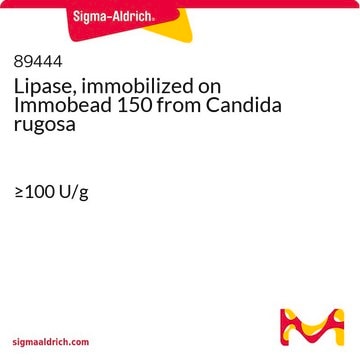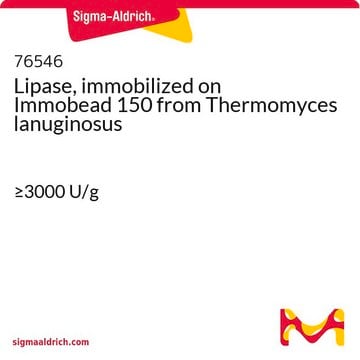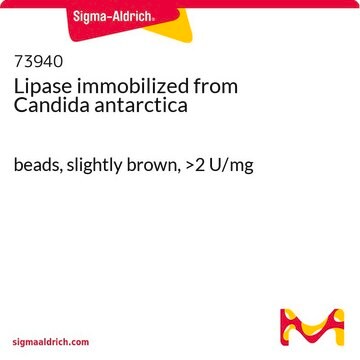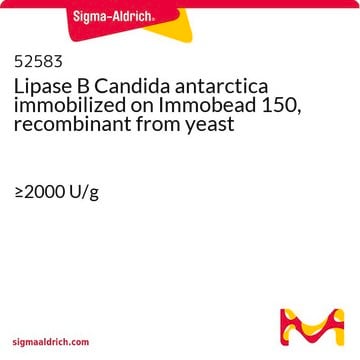94129
Immobead 150P
0.15-0.50 mm particle size
Synonym(s):
Copolymer of methacrylate, cross-linked and carrying oxirane groups
Sign Into View Organizational & Contract Pricing
All Photos(1)
About This Item
UNSPSC Code:
12352200
NACRES:
NA.25
Recommended Products
form
beads
loss
≤10% loss on drying
particle size
0.15-0.50 mm
storage temp.
−20°C
Application
Immobead 150 0.15-0.30 mm particle size, a resin for enzyme/protein immobilization, is used for covalent binding of enzymes such as lipases. Bound enzymes are easy to repurify and use in industrial applications.
Storage Class Code
11 - Combustible Solids
WGK
WGK 3
Flash Point(F)
Not applicable
Flash Point(C)
Not applicable
Personal Protective Equipment
dust mask type N95 (US), Eyeshields, Gloves
Certificates of Analysis (COA)
Search for Certificates of Analysis (COA) by entering the products Lot/Batch Number. Lot and Batch Numbers can be found on a product’s label following the words ‘Lot’ or ‘Batch’.
Already Own This Product?
Find documentation for the products that you have recently purchased in the Document Library.
Lili Li et al.
Colloids and surfaces. B, Biointerfaces, 102, 124-129 (2012-09-27)
Amino-cyclodextrin was covalently attached to multiwalled carbon nanotubes (MWNTs). The functionalized MWNTs have a good dispersibility in water. The lipase was adsorbed onto the functionalized MWNTs. The immobilized lipase was utilized for the resolution of the model compound (R, S)-1-phenyl
Lipase Immobilization on Hypercrosslinked Polymer Coated Silica for Biocatalytic Synthesis of Phytosterol Esters with Controllable Fatty Acid Composition.
Zheng M, Lu Y, Huang F, Wang L, Guo P, et al.
Journal of Agricultural and Food Chemistry (2012)
Bo Chen et al.
Langmuir : the ACS journal of surfaces and colloids, 24(23), 13457-13464 (2008-11-11)
A series of epoxy-activated polymer films composed of poly(glycidyl methacrylate/butyl methacrylate/hydroxyethyl methacrylate) were prepared. Variation in comonomer composition allowed exploration of relationships between surface wettability and Candida antartica lipase B (CALB) binding to surfaces. By changing solvents and polymer concentrations
Ming-Ming Zheng et al.
Bioresource technology, 115, 141-146 (2012-01-03)
In this work, mixed-mode silica particles functionalized with octyl and sulfonic acid groups was conveniently prepared by co-bonding a mixture of n-octyltriethoxysilane and 3-mercaptopropyltriethoxysilane and then oxidized with hydrogen peroxide. Candida rugosa lipase (CRL) was immobilized on the mixed-mode silica
Our team of scientists has experience in all areas of research including Life Science, Material Science, Chemical Synthesis, Chromatography, Analytical and many others.
Contact Technical Service







